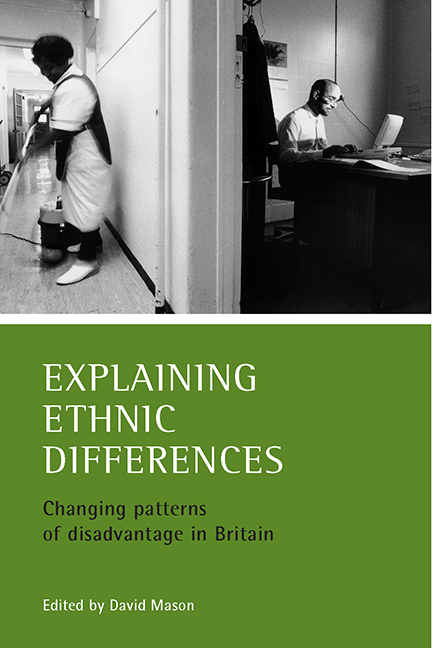Book contents
- Frontmatter
- Contents
- List of figures and tables
- Foreword
- Notes on contributors
- one Introduction
- two Changing ethnic disadvantage: an overview
- three The demographic characteristics of people from minority ethnic groups in Britain
- four Ethnic differentials in educational performance
- five Changing patterns of ethnic disadvantage in employment
- six Patterns of and explanations for ethnic inequalities in health
- seven Housing black and minority ethnic communities: diversity and constraint
- eight ‘All the women are white, all the blacks are men – but some of us are brave’: mapping the consequences of invisibility for black and minority ethnic women in Britain
- nine Police lore and community disorder: diversity in the criminal justice system
- References
- Index
one - Introduction
Published online by Cambridge University Press: 20 January 2022
- Frontmatter
- Contents
- List of figures and tables
- Foreword
- Notes on contributors
- one Introduction
- two Changing ethnic disadvantage: an overview
- three The demographic characteristics of people from minority ethnic groups in Britain
- four Ethnic differentials in educational performance
- five Changing patterns of ethnic disadvantage in employment
- six Patterns of and explanations for ethnic inequalities in health
- seven Housing black and minority ethnic communities: diversity and constraint
- eight ‘All the women are white, all the blacks are men – but some of us are brave’: mapping the consequences of invisibility for black and minority ethnic women in Britain
- nine Police lore and community disorder: diversity in the criminal justice system
- References
- Index
Summary
Background
This volume arises from a seminar entitled Explaining ethnic differences, which was jointly organised by the then Department for Transport, Local Government and the Regions (DTLR) and the Economic and Social Research Council's ‘Cities’ programme. Held in December 2001, the seminar was intended to help inform the policy response to a series of communal disturbances that had taken place in a number of towns, including Bradford, Burnley and Oldham, in the north of England, in the spring and summer of that year. These disturbances, or riots, were notable for the participation of large numbers of young men of South Asian descent, a significant proportion of them Muslim. Such overt conflict between Asian (as against African-Caribbean) young men and the police, was not entirely unprecedented but the scale of the disturbances, together with the involvement of far right white groups, shocked the political establishment and led to series of inquiries and official reports. By bringing together policy makers and social scientists with experience of researching various aspects of ethnic disadvantage, the seminar aimed to explore the current state of knowledge about the structure of ethnic disadvantage and to review explanations for the patterns observed. The chapters that make up this volume are all, with the exception of Chapter Five, revised versions of presentations made to the seminar.
Like the report of the Macpherson inquiry into the investigation of the murder of Stephen Lawrence published two years earlier (1999), the urban disturbances of 2001 refocused attention on the continuing significance of ethnic disadvantage for public policy. In this respect, the disturbances might be said to fit into a long-established pattern in the development of policies to address ethnic disadvantage in Britain, that is, the tendency, after a period of public hand wringing and a spate of policy initiatives, for the issue of ethnic inequity to disappear from the agenda for a period, before dramatically being forced back on – not infrequently by events on the streets. In this respect, it might be said that British policy has frequently failed to learn the lessons of the past or, at least, has consistently failed to act on them. Virinder Kalra's contrast between the events following the Brixton riots of 1981 and those of 2001 represents one of the more dramatic examples of the case in point (Chapter Nine of this volume), but there are others.
- Type
- Chapter
- Information
- Explaining Ethnic DifferencesChanging Patterns of Disadvantage in Britain, pp. 1 - 8Publisher: Bristol University PressPrint publication year: 2003



